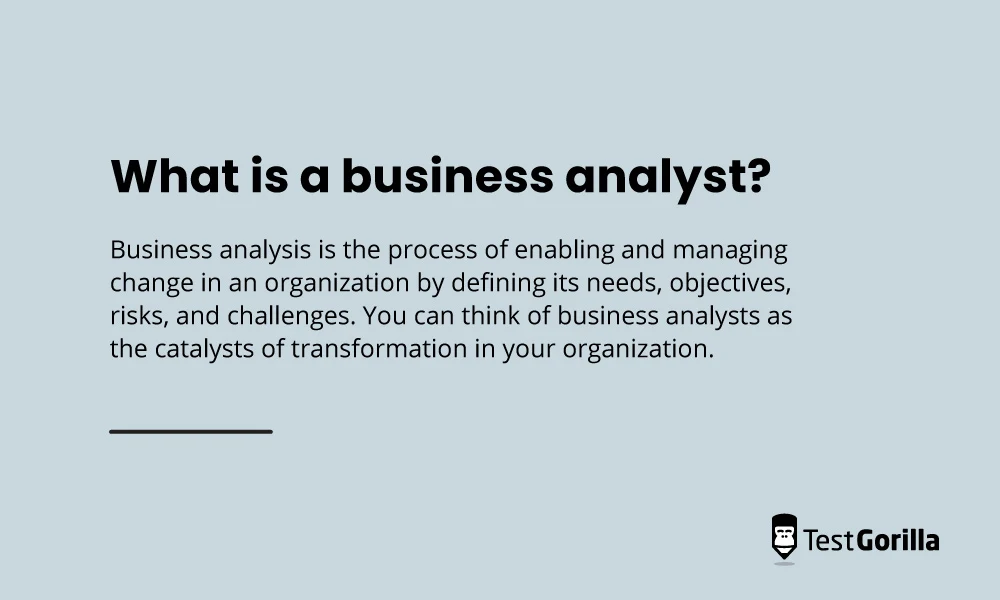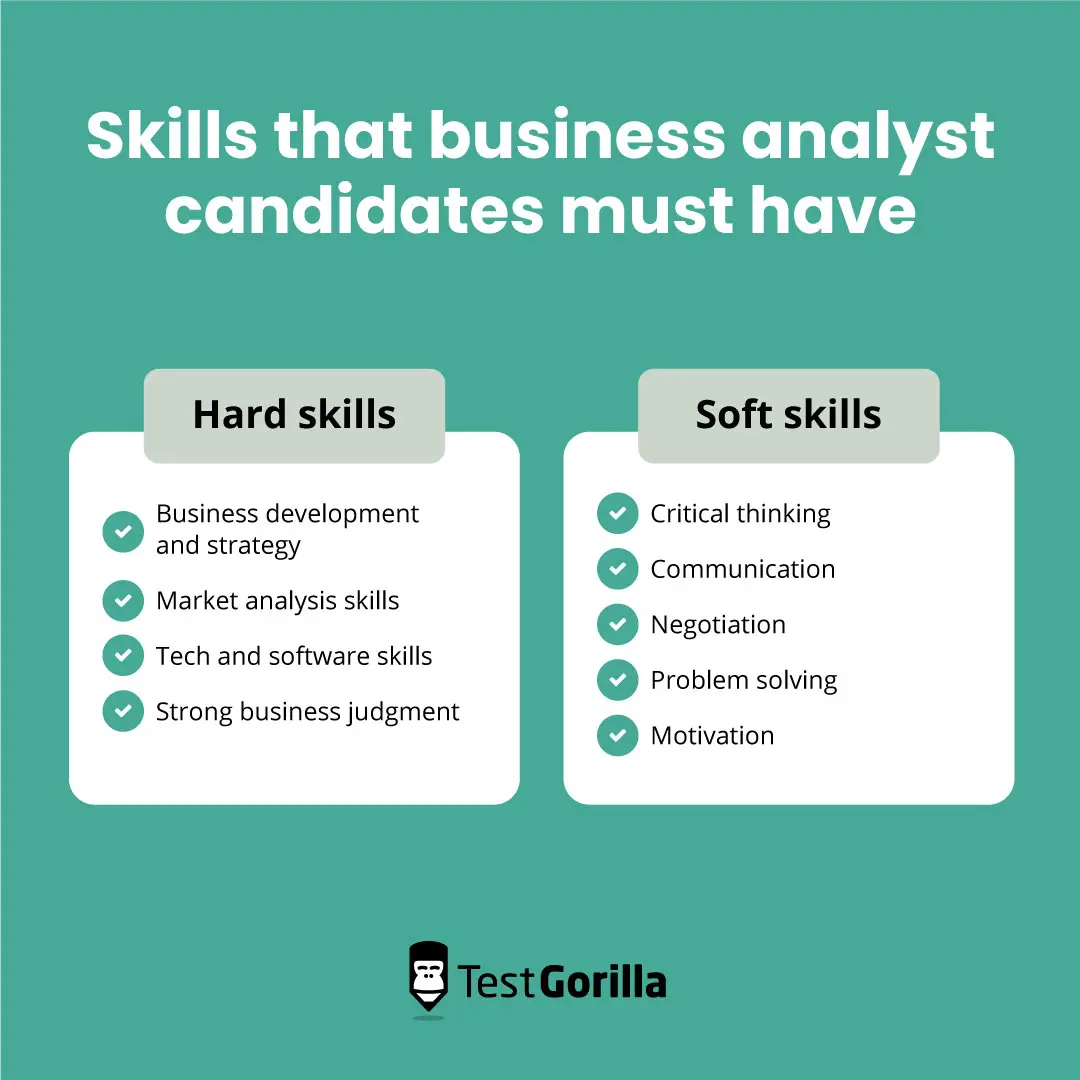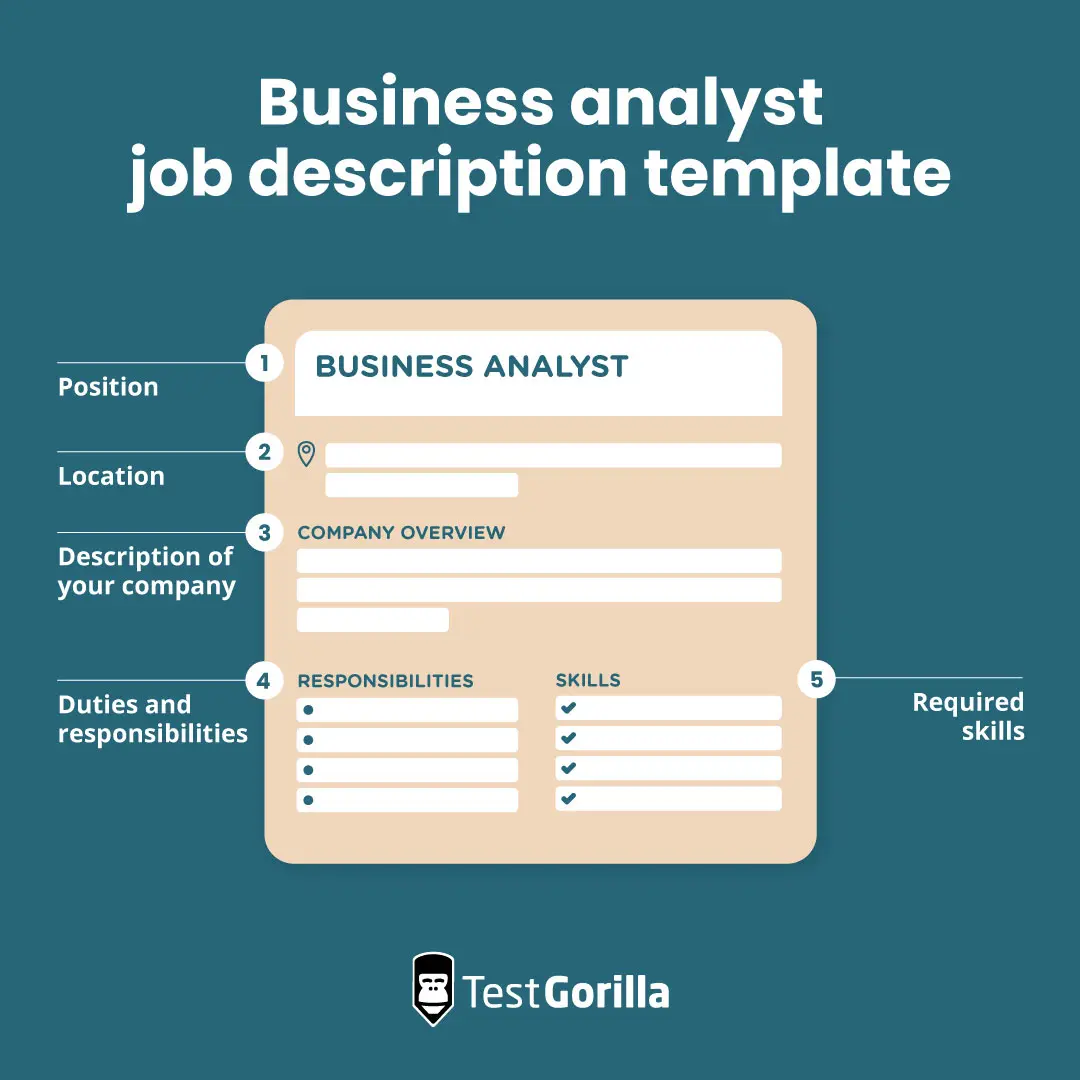We live in a turbulent time for business. Businesses are still recovering from the effects of the COVID-19 pandemic and the inflation crisis.
In this context, identifying potential risks, finding solutions for setbacks, and spotting favorable growth opportunities are critical for your company’s success.
This makes the role of a business analyst extremely important. Understanding market shifts, monitoring, analyzing, and documenting their impact on your business, and making sure that your company’s needs are met are all fundamental parts of the job of a business analyst.
Business analysts are in high demand as organizations are turning to data to make key decisions. But that’s also what makes it challenging to find a qualified business analyst for your company. Making a bad hire for such an important role can have a strong negative impact on your bottom line.
In this article, you’ll find out more about:
The job of a business analyst and what skills they need
The most reliable ways to evaluate your candidates’ skills, such as pre-employment skills testing and structured interviews
Where to source talented candidates
Average salaries
Table of contents
- What is a business analyst?
- What are the key business analyst hard skills?
- What soft skills do business analysts need?
- How can you test business analyst skills?
- Business analyst interview questions
- Where can you find skilled business analysts?
- Business analyst job description template
- How much does a business analyst cost?
- Hire a business analyst with no bias by using pre-employment skills testing
What is a business analyst?
Business analysis is the process of enabling and managing change in an organization by defining its needs, objectives, risks, and challenges.
You can think of business analysts as the catalysts of transformation in your organization. They work across every level of your company and need to be involved in every process to:
Analyze performance and identify areas of improvement
Define a strategy for change
Redesign your enterprise’s structure and architecture
Define project goals and requirements
Actively support the continuous improvement of your business
According to McKinsey & Company, one of the best ways to manage change is to instill ownership and define responsibilities clearly from the start. A business analyst can play a crucial leadership role in this process and help guide the transformation journey of your organization.
There are other job roles related to business analysis, such as systems analyst, requirements engineer, process analyst, or business architect.
Business analysts focus on analyzing a company’s performance so they can define key problems and recommend strategies that can solve them effectively. Most of the solutions that business analysts suggest have a technical component – but aren’t limited to those.
Depending on the type of organization they’re working for, a business analyst may use data analysis tools to identify ways to improve products, services, software, hardware, or entire processes.
They can specialize in inventory management, corporate management, or technology structure, so before you begin your business analyst hiring process, it’s best to define the exact responsibilities of the role.
Some of the usual tasks of business analysts are to:
Define business requirements and needs
Do in-depth data business analysis and use data to recommend solutions
Convey the necessary adjustments to stakeholders, management, and partners
Incorporate organizational changes, such as improving processes or developing new policies
Do research to assess business strengths, weaknesses, opportunities, and threats
Improve the efficiency of key processes such as sales and marketing
Bridge the gap between IT and business goals
Forecast financial performance and define budgets
Improve pricing strategies
Build an overall management strategy for your organization
What are the key business analyst hard skills?
Some of the hard skills that a business analyst must have are:
Business development and strategy
Business development’s main goal is to help a company grow and become more successful. Therefore, a business analyst needs to know how to build and implement strategies that boost revenue and help your organization redefine and reach its objectives. This requires deep knowledge of business processes, industry trends, and buyer behavior.
A business analyst who has a strong grasp of business development should be able to:
Devise actionable plans to boost profits and encourage growth
Seek new business opportunities
Build and maintain relationships with clients and investors
Identify strategic partnerships
Market analysis skills
Business analysts must be able to build a detailed assessment of your organization’s target market and its competitive landscape. These assessments reduce the risk for your business and help you identify promising growth opportunities.
A thorough market analysis will help you get answers to questions such as:
Who is my ideal client and what are their buying habits?
What does a typical sales cycle for my industry look like? How does ours compare to it?
How much are clients willing to pay for my products or services?
Who are my main competitors and are there any market gaps I could explore?
Tech and software skills
A business analyst must have well-rounded tech skills for two reasons:
Many business analysts serve as mediators between stakeholders and the IT team and suggest new technological solutions for certain issues in your organization
The role of a business analyst requires knowledge of data analysis and visualization software tools such as Microsoft Power BI, Tableau, Qlik Sense, Microsoft Visio, and more
Strong technical skills enable business analysts to:
Collect and organize data
Make graphs
Design data visualizations
Strong business judgment
Business analysts must have a good nose for value. This means knowing which strategies can lead to improvement, making the right business decisions, and understanding what makes a trade-off profitable and beneficial for the business.
People with good business judgment:
Are aware of their own biases
Make informed decisions instead of relying on their own opinion or gut feeling
Listen attentively to others so they can explore alternative approaches and perspectives
Analyze carefully any information before they make a final decision
What soft skills do business analysts need?
The essential soft skills of a business analyst include:
Critical thinking
Using an informed evidence-based approach is important for every business analyst. You need a candidate who can observe, research, and interpret objectively complex data and find reasonable solutions.
People with strong critical-thinking skills can:
Quickly assess a situation
Evaluate problems objectively
Provide valuable insights
Work well in team settings to accomplish goals
Communication
Excellent communication competence is a must-have for any business analyst worth their salt. The ability to express themselves clearly and concisely and present information to a wide range of audiences is crucial for success.
Business analysts who are strong communicators know how to:
Uses professional etiquette when communicating in a work environment
Conveys ideas, facts, opinions, and solutions in a comprehensible way
Listens attentively to others so they can tailor better solutions and understand their clients’ needs better
Negotiation
A business analyst has to use their negotiation skills on a day-to-day basis in order to:
Determine which stakeholders’ requests are functional or non-functional requirements
Prioritize requirements based on business needs
Guide cross-functional teams towards the implementation of key business processes and strategies
Usually, there are many parties involved in the processes that business analysts manage. This means there might be conflicting interests. Strong negotiation skills enable your business analyst to reach solutions that benefit every party.
Problem solving
Essentially, problem solving is what a business analyst does for a living. They must use their problem solving skills in every project they manage.
Having good problem solving skills means you’re able to effectively:
Define a problem
Determine its cause
Identify different solutions
Determine which is the best one
Execute it
Motivation
When you’re hiring someone for a task as fundamental for your company’s success as facilitating organizational changes, you need to make sure they’re aligned with the position and your company and are highly motivated to excel.
Motivated business analysts:
See their work as meaningful
Take full responsibility for the outcomes of their work
Know clearly what results they can get you
How can you test business analyst skills?
Pre-employment skills testing is a method you can use to evaluate objectively a candidate’s current skills and suitability for most roles, including that of a business analyst.
And, if you combine them with structured interviews, you have a winning combination that will set you up for a successful recruitment process.
Technical knowledge, cognitive ability, soft skills, language proficiency, situational judgment, and many more – with pre-employment skills tests, you can assess many of the facets of candidates’ skill sets.
Skills testing is a science-based method that enables you to:
Get to know your candidates better
Eliminate unconscious bias from recruitment
Make data-driven hiring decisions
Ask better questions during interviews
To make the most out of pre-employment skills testing, you need reliable testing software like TestGorilla.
With our platform, you can build a skills assessment of up to five tests. Check out our test library to pick the tests that are the most relevant to the job role you’re looking to fill – or find our recommendations in the next section.
Recommended tests for the role of a business analyst
Here is a list of skills tests that you can use to evaluate the skills of your future business analyst. Pick five that best suit your requirements for the role:
Business judgment: Hire a business analyst with a good nose for value.
IT business analyst: If you’re an IT company, you can use this test to evaluate each candidate’s aptitude in IT business analysis.
Market analysis: This test will help you identify candidates who can interpret market factors accurately to provide strategic solutions for your business.
Business operations management: Find candidates who can plan, organize, and control business operations.
Tableau: This test will help you identify candidates who have practical skills with Tableau, one of the most commonly used business-intelligence software tools.
Microsoft Visio: Assess a candidate's ability to make full use of Visio, Microsoft's diagramming and visualization tool.
Negotiation: Assess whether candidates have the right skills to lead a successful negotiation process.
Communication: Use this test to evaluate your candidates’ verbal and written communication skills in a professional setting.
Motivation: Check whether your applicants’ expectations align with what your company has to offer.
Critical thinking: This test evaluates a candidate’s ability to be analytical and think critically.
Problem solving: This test assesses your candidates’ responses in complex situations.
Business analyst interview questions
Once you identify your best candidates with the help of skills tests, it’s time to invite them to an interview for a deeper assessment of their skills and past experience.
Here are some interview questions you can ask applicants to see if they have the right skills for the role:
What's your process for gathering requirements in a project?
How do you distinguish between functional and nonfunctional requirements?
How do you prioritize conflicting requests from stakeholders?
What's your strategy for making sure different business units are aligned in their goals?
What organizational methodologies and frameworks are you most familiar with?
Explain a time when you proposed an unpopular solution. How did you convince others to adopt it?
Describe a time you used a data visualization tool to illustrate a complex idea or pattern.
Describe a time when you made a major mistake in your analysis. How did you handle it?
How would you handle a situation where, after your analysis, you realize the project is not beneficial for the company?
Describe a situation where you had to collaborate with a cross-functional team. What challenges did you face and how did you overcome them?
A key stakeholder is difficult to reach and only gives vague responses. How do you ensure that you're able to accurately capture their requirements?
How do you prioritize between short- and long-term business goals?
If you need more ideas for questions you could ask, check out our in-depth interview questions for business analysts or for IT business analysts.
Where can you find skilled business analysts?
The next step in our guide on how to hire a business analyst is to help you source the right candidates.
So, where do you find the right business analyst?
First, you need to decide if you would rather hire a full-time employee or a freelancer.
Many companies prefer to hire a freelance business analyst. Freelancers are more suited for:
Startups
Small and medium-sized enterprises (SMEs)
Building a strategy for a temporary project
Solving a particular issue
Consultations
Where to find in-house business analysts
Here are some of the methods and platforms you can use when looking for a full-time business analyst:
Referrals: Your current employees may help you find someone who is aligned with your company’s values and works with integrity and motivation.
LinkedIn: The largest professional social media network enables you to not only post job ads but also search for passive candidates who might not be actively looking for a job at the moment.
Indeed: Indeed’s diverse talent pool gives you many options to pick from.
The job board of the International Institute of Business Analysis (IIBA): You can use IIBA’s job board to post an ad and reach out to qualified candidates. That’s one of the platforms we use.
Where to find freelance business analysts
If you’re looking to hire a freelancer, here are some of the platforms you can use:
Toptal: This platform is known for its exclusive selection of top freelancers from every field.
Flexjobs: Flexjobs specializes in remote and flexible jobs.
Upwork: This is one of the most widely used freelancing platforms with a large talent pool that offers a lot of variety.
Business analyst job description template
Position: Business analyst in [industry]
Location: [City, state, or remote]
[Your company name] is a [type of company] on a mission to [brief description of your mission]. We’re seeking an experienced business analyst to join our team, take ownership of transformation initiatives and help us navigate our growth journey.
Key responsibilities
In this role, you will:
Gather, analyze, and prioritize business requirements
Lead key business transformation projects
Work closely with stakeholders and different business units to ensure project alignment with business objectives
Collaborate with cross-functional teams to develop and implement solutions
Analyze performance and results and identify improvement opportunities
Assess risk and design risk mitigation strategies
Required skills
The ideal candidate possesses:
Excellent analytical skills
Proficiency in business intelligence and data visualization tools such as [give examples]
The ability to transform business needs into actionable strategies
Familiarity with Agile methodologies
How much does a business analyst cost?
According to salary.com, the average salary for a business analyst in the US is slightly above $82,000 per year.
The salary range usually falls between $74,564 and $91,449 and depends on the candidate’s skills and experience, as well as your industry, company size, and location.
Hire a business analyst with no bias by using pre-employment skills testing
A business analyst can transform your business and unlock new growth opportunities. For this, hiring the right candidate is essential, especially given the high costs of a bad hire.
Pre-employment skills testing is here to help you evaluate your candidates accurately and objectively and eliminate bias from the hiring process.
Sign up for a free demo with TestGorilla to find out more – or sign up for our free plan to try out 10 of our most popular tests and leverage the power of skills assessments, starting today.
Related posts
Hire the best candidates with TestGorilla
Create pre-employment assessments in minutes to screen candidates, save time, and hire the best talent.
Latest posts
The best advice in pre-employment testing, in your inbox.
No spam. Unsubscribe at any time.

Hire the best. No bias. No stress.
Our screening tests identify the best candidates and make your hiring decisions faster, easier, and bias-free.
Free resources
This checklist covers key features you should look for when choosing a skills testing platform
This resource will help you develop an onboarding checklist for new hires.
How to assess your candidates' attention to detail.
Learn how to get human resources certified through HRCI or SHRM.
Learn how you can improve the level of talent at your company.
Learn how CapitalT reduced hiring bias with online skills assessments.
Learn how to make the resume process more efficient and more effective.
Improve your hiring strategy with these 7 critical recruitment metrics.
Learn how Sukhi decreased time spent reviewing resumes by 83%!
Hire more efficiently with these hacks that 99% of recruiters aren't using.
Make a business case for diversity and inclusion initiatives with this data.




















